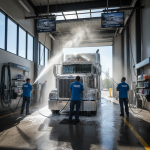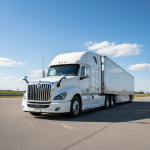In the fast-paced retail industry, truck wash operators face numerous challenges when it comes to profitability and customer satisfaction. As we look ahead to 2024, it’s crucial for operators to overcome these hurdles and find innovative ways to thrive in a competitive market.
With customers demanding convenience and quality, retail truck wash operators must focus on enhancing their services to meet and exceed these expectations. This includes investing in advanced equipment, adopting eco-friendly practices, and offering personalized solutions.
In addition, operators need to address their fears head-on and leverage technology to streamline their operations. By embracing automated systems and using data analytics, operators can optimize scheduling, streamline workflow, and reduce costly errors.
To further boost profitability, operators should also consider diversifying their services and exploring new revenue streams, such as offering additional cleaning services or partnering with complementary businesses.
By overcoming their fears, adopting customer-centric strategies, and embracing technological advancements, retail truck wash operators can not only enhance profitability but also deliver exceptional customer satisfaction in 2024 and beyond.
Common fears and challenges faced by retail truck wash operators
1. Fear of insufficient demand
One of the common fears that retail truck wash operators face is the fear of insufficient demand. With the retail industry becoming increasingly competitive, operators worry about attracting enough customers to sustain their business. This fear is often fueled by the perception that truck wash services are a luxury and not a necessity.
However, this fear can be overcome by understanding the market demand and implementing effective marketing strategies. By conducting market research and analyzing customer trends, operators can identify potential opportunities to expand their customer base. Additionally, offering competitive pricing, promotional offers, and loyalty programs can help attract and retain customers.
2. Fear of equipment costs
Another fear that truck wash operators often face is the fear of high equipment costs. Investing in advanced equipment can be a significant financial burden, especially for small-scale operators. The fear of not being able to afford state-of-the-art machinery can hinder operators from providing high-quality services and meeting customer expectations.
To overcome this fear, operators can explore alternative options such as leasing equipment or partnering with equipment manufacturers. Leasing allows operators to access the latest technology without the upfront cost, while partnerships can provide opportunities for discounted equipment or financing options. By carefully evaluating their financial situation and exploring different avenues, operators can find solutions that suit their budget and help them deliver superior services.
3. Fear of labor shortage
A common fear among retail truck wash operators is the fear of labor shortage. Finding and retaining skilled workers can be challenging, especially in an industry that requires specialized knowledge and expertise. The fear of not having enough qualified staff to handle the workload can hinder productivity and customer satisfaction.
To address this fear, operators can invest in employee training and development programs to upskill their existing workforce. By providing opportunities for growth and advancement, operators can attract and retain talented individuals who are committed to delivering exceptional service. Additionally, implementing efficient scheduling systems and offering competitive wages and benefits can help mitigate the risk of labor shortage.
The importance of profitability and customer satisfaction in the truck wash industry
Profitability and customer satisfaction are two key factors that determine the success of retail truck wash operations. In an industry that is highly competitive, operators must focus on maximizing profitability while ensuring customer satisfaction to stay ahead of the game.
1. Profitability as a measure of success
Profitability is essential for the long-term sustainability of any business, including retail truck wash operations. It not only enables operators to cover their expenses but also provides the resources necessary for growth and expansion. Profitability allows operators to invest in advanced equipment, train their staff, and enhance their services, ultimately leading to increased customer satisfaction.
By closely monitoring their financial performance and implementing cost-saving measures, operators can improve their bottom line. This includes optimizing water and detergent usage, reducing energy consumption, and implementing efficient scheduling systems to minimize downtime. By focusing on profitability, operators can ensure the financial health of their business and create opportunities for future growth.
2. Customer satisfaction for business growth
Customer satisfaction is a crucial aspect of any retail truck wash operation. Satisfied customers not only become repeat customers but also spread positive word-of-mouth, attracting new business. In a highly interconnected world where customer reviews and ratings can make or break a business, providing exceptional service is more important than ever.
To enhance customer satisfaction, operators should strive to provide a seamless and personalized experience. This can be achieved through efficient and timely service, attention to detail, and excellent customer communication. Additionally, operators should invest in eco-friendly practices to align with the growing demand for sustainable solutions. By understanding their customers’ needs and delivering on their expectations, operators can build a loyal customer base and drive business growth.

Strategies for boosting profitability in retail truck wash operations
Boosting profitability in retail truck wash operations requires a combination of strategic planning, efficient operations, and smart resource management. Here are some strategies that operators can implement to maximize their profitability:
1. Invest in advanced equipment and technology
Investing in advanced equipment and technology is crucial for improving efficiency and reducing operational costs. Modern truck wash equipment is designed to minimize water and detergent usage while delivering superior cleaning results. By adopting state-of-the-art technology, operators can streamline their operations, reduce wastage, and ultimately save on expenses.
Additionally, automated systems can help optimize scheduling and workflow management. By leveraging technology, operators can eliminate manual errors, reduce labor costs, and improve overall productivity. Investing in technology not only enhances profitability but also ensures consistent service quality, leading to higher customer satisfaction.
2. Implement data analytics for informed decision-making
Data analytics provides valuable insights into customer behavior, market trends, and operational efficiency. By utilizing data analytics tools, operators can identify areas of improvement, make informed business decisions, and optimize their operations for maximum profitability.
For example, analyzing customer preferences and purchase patterns can help operators tailor their services to meet specific demands. Understanding peak hours and popular services can enable operators to optimize scheduling, minimize wait times, and maximize revenue. Data analytics also allows operators to identify cost-saving opportunities, such as optimizing resource allocation and reducing unnecessary expenses.
3. Diversify services and explore new revenue streams
To boost profitability, retail truck wash operators should consider diversifying their services and exploring new revenue streams. Offering additional cleaning services, such as interior detailing or engine cleaning, can attract a wider range of customers and increase revenue per transaction. Partnering with complementary businesses, such as gas stations or truck repair shops, can create cross-promotion opportunities and drive additional foot traffic.
Furthermore, operators can consider offering subscription-based services or loyalty programs to encourage repeat business. By providing incentives and rewards, operators can build customer loyalty and increase customer lifetime value. Diversifying services and exploring new revenue streams not only enhances profitability but also strengthens the overall business model.
Enhancing customer satisfaction in the retail truck wash industry
Customer satisfaction is a key driver of success in the retail truck wash industry. By focusing on delivering exceptional service and meeting customer expectations, operators can build a loyal customer base and enhance their reputation. Here are some strategies to enhance customer satisfaction:
1. Provide personalized solutions
Every customer has unique requirements and preferences. By offering personalized solutions, operators can cater to individual needs and deliver a more satisfying experience. This can include tailoring cleaning packages based on the type of vehicle, offering add-on services based on customer preferences, or providing flexible scheduling options.
Operators should invest in customer relationship management (CRM) systems to track customer preferences and histories. By leveraging CRM data, operators can provide personalized recommendations and ensure consistent service quality. Personalized solutions demonstrate that operators value their customers and are committed to meeting their specific needs.
2. Focus on convenience and efficiency
In today’s fast-paced world, customers value convenience and efficiency. Retail truck wash operators should prioritize minimizing wait times and providing a streamlined service experience. This includes optimizing scheduling, ensuring quick turnaround times, and offering online booking and payment options.
Operators should invest in customer communication tools, such as mobile apps or text message notifications, to keep customers informed about their service status. By proactively managing customer expectations and providing timely updates, operators can enhance the overall customer experience.
3. Embrace eco-friendly practices
Sustainability is an increasingly important consideration for customers. By adopting eco-friendly practices, retail truck wash operators can attract environmentally conscious customers and differentiate themselves from the competition. This includes using biodegradable cleaning agents, implementing water recycling systems, and minimizing energy consumption.
Operators should communicate their commitment to sustainability through marketing materials and signage. By showcasing their eco-friendly practices, operators can appeal to customers who prioritize environmentally responsible businesses. Embracing eco-friendly practices not only enhances customer satisfaction but also contributes to a cleaner and more sustainable future.

Addressing concerns about labor costs and employee turnover
Labor costs and employee turnover are common concerns for retail truck wash operators. Hiring and retaining skilled workers can be challenging, and high turnover rates can disrupt operations and impact customer satisfaction. However, by implementing effective strategies and creating a positive work environment, operators can address these concerns and build a loyal and competent workforce.
One approach to address labor costs is to optimize staffing levels based on customer demand and workflow analysis. By closely monitoring customer traffic and analyzing historical data, operators can determine peak hours and allocate staff accordingly. This ensures that there are enough employees to handle the workload during busy periods while avoiding unnecessary expenses during slower times.
To attract and retain skilled workers, operators should consider offering competitive wages and benefits packages. This includes providing regular pay raises, incentives for exceptional performance, and opportunities for career advancement. By offering a competitive compensation package, operators can attract top talent and reduce turnover rates.
Creating a positive work environment is also crucial in addressing concerns about employee turnover. Operators should foster a culture of respect, open communication, and teamwork. Regular employee feedback sessions and performance evaluations can help identify and address any concerns or issues. Providing opportunities for training and professional development can also motivate employees and enhance their job satisfaction.
Additionally, operators can consider implementing employee retention programs such as recognition programs, employee engagement initiatives, and employee assistance programs. These programs not only boost morale and job satisfaction but also create a sense of loyalty and commitment among employees.
In conclusion, addressing concerns about labor costs and employee turnover requires a proactive and employee-centric approach. By optimizing staffing levels, offering competitive wages and benefits, creating a positive work environment, and implementing retention programs, retail truck wash operators can attract and retain skilled workers, ensuring smooth operations and customer satisfaction.
Implementing technology solutions to streamline operations and improve efficiency
Technology plays a crucial role in streamlining operations and improving efficiency for retail truck wash operators. By embracing technological advancements, operators can overcome challenges, reduce costs, and enhance overall productivity. From automated systems to data analytics, there are several technology solutions that can help operators optimize their operations.
One of the key technologies that can greatly benefit retail truck wash operators is an automated scheduling system. By implementing a digital scheduling platform, operators can efficiently manage appointments, allocate resources, and reduce waiting times for customers. This not only improves customer satisfaction but also streamlines workflow and improves operational efficiency.
In addition to automated scheduling, operators should consider investing in data analytics tools to gain insights into their operations. By analyzing data such as customer preferences, peak hours, and service durations, operators can make data-driven decisions to optimize their operations. For example, data analytics can help identify trends and patterns that can be used to fine-tune service offerings, adjust pricing strategies, and improve resource allocation.
Another technology solution that can streamline operations is a point-of-sale (POS) system. By integrating a POS system with the scheduling and billing processes, operators can automate transactions, track sales, and generate reports. This not only saves time but also reduces the risk of errors and enhances financial management.
Furthermore, operators can leverage technology to enhance communication and customer engagement. Implementing a mobile app or a customer portal can provide customers with convenient access to services, appointment scheduling, and real-time updates. This not only improves the customer experience but also reduces administrative tasks and improves overall efficiency.
In conclusion, implementing technology solutions is essential for retail truck wash operators to streamline operations and improve efficiency. By embracing automated systems, utilizing data analytics, implementing POS systems, and leveraging technology for communication and customer engagement, operators can optimize their operations, reduce costs, and enhance overall productivity.
Utilizing marketing and branding strategies to attract and retain customers
In the competitive retail truck wash industry, effective marketing and branding strategies are essential for attracting and retaining customers. By creating a strong brand identity, leveraging digital marketing channels, and offering personalized experiences, operators can stand out from the competition and build a loyal customer base.
First and foremost, operators should focus on developing a unique brand identity that resonates with their target market. This includes creating a compelling brand story, designing a visually appealing logo and signage, and ensuring consistent branding across all touchpoints. A strong brand identity helps build trust, creates a memorable impression, and differentiates operators from their competitors.
Digital marketing channels provide a cost-effective and targeted way to reach potential customers. Operators should invest in a user-friendly website that showcases their services, pricing, and contact information. Search engine optimization (SEO) techniques can be employed to improve visibility in search engine results, while pay-per-click (PPC) advertising campaigns can be used to drive targeted traffic to the website. Social media platforms can also be utilized to engage with customers, share updates, and run promotional campaigns.
Personalization is another key aspect of attracting and retaining customers. Operators should strive to understand their customers’ preferences and offer tailored experiences. This can be achieved by implementing a customer relationship management (CRM) system to collect and analyze customer data, enabling operators to personalize communication, recommend relevant services, and offer loyalty rewards.
Word-of-mouth marketing is a powerful tool in the retail truck wash industry. Operators should encourage satisfied customers to leave reviews and testimonials, both online and offline. Offering referral incentives can also incentivize customers to spread the word about the quality of the services provided.
In conclusion, utilizing effective marketing and branding strategies is vital for retail truck wash operators to attract and retain customers. By creating a strong brand identity, leveraging digital marketing channels, offering personalized experiences, and encouraging word-of-mouth marketing, operators can build a loyal customer base and thrive in a competitive market.

Conclusion: Embracing change and growth in the retail truck wash industry
As we look ahead to 2024, retail truck wash operators face numerous challenges in terms of profitability and customer satisfaction. However, by overcoming fears related to equipment maintenance and repair, addressing concerns about labor costs and employee turnover, implementing technology solutions, and utilizing effective marketing and branding strategies, operators can boost profitability and enhance customer satisfaction.
The retail truck wash industry is constantly evolving, and operators must be willing to embrace change and adapt to new trends and technologies. By staying abreast of industry advancements, exploring new revenue streams, and continually improving their services, operators can position themselves as leaders in the market.
Furthermore, collaboration and knowledge-sharing within the industry can be valuable for operators. Participating in industry conferences, joining professional associations, and networking with peers can provide opportunities to learn from others’ experiences, gain insights, and stay updated on industry best practices.
In conclusion, by overcoming fears, adopting customer-centric strategies, embracing technological advancements, and actively seeking growth opportunities, retail truck wash operators can not only enhance profitability but also deliver exceptional customer satisfaction in 2024 and beyond. With a proactive and forward-thinking approach, operators can thrive in a competitive market and build a successful and sustainable business.




